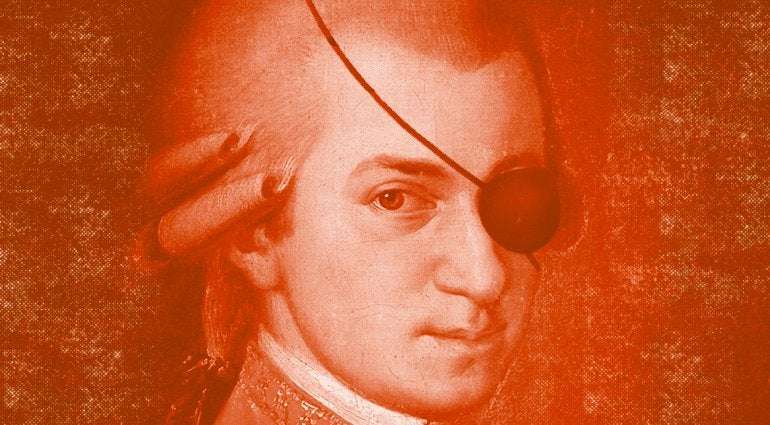Nowadays the music industry surrenders to the fact that unauthorized downloads and streaming of music happen, there is not much that can be done about this illegal activity on the Internet. You may think that this is a phenomenon of our highly technical time, but think again. Almost 250 years ago, one of the most musical secrets of the Vatican was pirated by a 14-year-old. Musical mystery in the Sistine Chapel, Rome, was a reality in the 17th and 18th centuries. For 140 years a composition by Gregorio Allegri called “Misere mei, deus” was performed only during Holy Week. Since 1630, the a-cappella score of the priest was guarded as a secret of the Vatican. Distribution and its performance anywhere else was strictly forbidden. Anyone who dared to do it would have been excommunicated. In the eyes and ears of the Pope, the choral work is so close to Heaven and perfection that sharing its sheet music would be criminal. And the Pope’s word was law.
The prescribed “copy protection” is – so the Vatican believes – quite simple. After all, we are talking about the time from Baroque to Viennese Classicism. There is only one score written by hand and the voice set in Miserere is far too complex to memorise by ear and then perform or write out at home. Keeping it secret, therefore, should not be a problem. Secrecy does not protect against ingenuity. If it hadn’t been for this 14-year-old musical wonder child: It was written by Pope Clement XIV and was allowed to participate in a Wednesday service of the performance in the Sistine Chapel. He heard Allegri’s Miserere mei, Deus and then wrote it down almost perfectly.
The following Good Friday he sat again in church and made a few corrections. His name was Wolfgang Amadeus Mozart. When the youthful Mozart continued his journey to Italy, he revealed the secret of the heavenly choral piece, which had long since been shrouded in legend.
Congenial pirate, creative thief or whistle-blower?
Was Mozart really the first “music pirate“? Well, not according to today’s points of view. He had only written down a song without spreading it or making, or wanting to make, a profit out of it. Technologies had not yet been invented to spread the manuscript to thousands of people instantaneously, Internet music piracy was still centuries away. Mozart has given the “Miserere mei, deus” freedom, he released it from a cage of unnecessary protection with his ingenuity, perfect hearing and naïvety. Perhaps we will rather agree on the term “first musical whistle-blower“.
It is also interesting that Mozart was by no means punished; quite the contrary. The Pope was so impressed by his extraordinary abilities that he knighted the boy in the “Chivalric Order of the Golden Spur“. To illustrate the degree of difficulty: The Miserere is a choral movement for nine voices. While a five-part choir sings one version of the piece, another four-part choir sings on an ornamented variant elsewhere in the room. All that with a length of about 12 – 13 minutes, although there are several different versions. Storing all this in your head and transcribing it?! Respect!
No carte blanche for music piracy
By the way, this article is by no means an homage to music pirates. The music industry, including composers, lyricists and musicians, are suffering particularly from the unauthorized distribution of their songs and works. It is estimated that only counterfeit money has a higher profit margin than music piracy. Incredible, isn’t it? So please don’t steal music and support the artists who have worked extremely hard to create it for you.

thetomahawk42 on September 13rd, 2020 at 18:21 UTC »
Iirc he went to listen to it once, then wrote the whole thing down. He then went to listen a second time and made some corrections.
WeirdEngineerDude on September 13rd, 2020 at 17:07 UTC »
You wouldn’t download a harpsichord....
toan55 on September 13rd, 2020 at 17:05 UTC »
Allegri - Miserere mei, Deus.